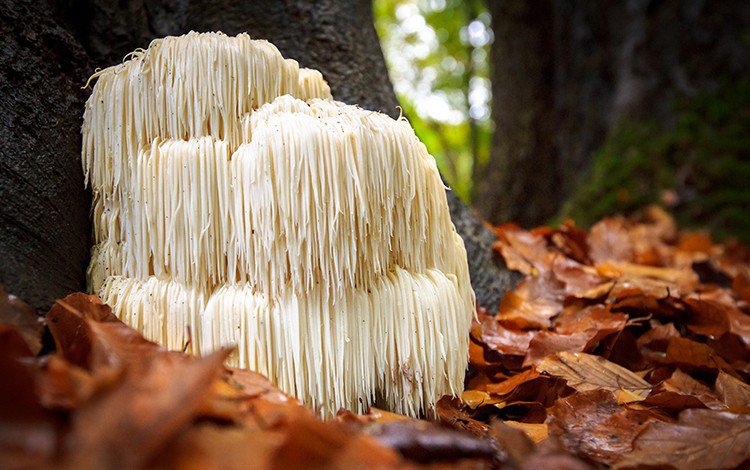
Lion’s Mane Mushroom Uses and Benefits
Definition of Lion’s Mane Mushroom
Lion’s Mane mushroom, also known as Hericium erinaceus, is a unique and highly valued medicinal mushroom with a long history of use in traditional Chinese medicine. It can also be found in North America and is considered an edible mushroom.
This mushroom gets its name from its appearance, resembling the mane of a lion. Lion’s Mane mushroom is known for its potential health benefits, particularly its effects on cognitive function and brain health. It contains bioactive compounds that have been found to stimulate the production of nerve growth factor (NGF), a protein that plays a crucial role in the development, growth, and maintenance of nerve cells.
As a result, Lion’s Mane mushroom may support cognitive function, memory, and focus. In addition to its cognitive benefits, the beneficial fungus exhibits antioxidant and anti-inflammatory effects, making it potentially beneficial for various medical conditions, including neurodegenerative diseases and inflammatory bowel disease.
With its growing popularity, Lion’s Mane mushroom can be found in various forms, including culinary use, as dietary supplements, and as extracts.
Health Benefits of Lion’s Mane Mushroom
Lion’s mane mushroom, scientifically known as Hericium erinaceus, is known for its numerous health benefits, particularly in enhancing cognitive function. This mushroom has gained popularity for its potential to improve memory, focus, and clarity.
One of the major reasons behind the cognitive benefits of lion’s mane mushroom is its antioxidant properties. It contains bioactive compounds that can neutralize harmful free radicals in the body, reducing oxidative stress and damage to brain cells. Additionally, lion’s mane mushroom has anti-inflammatory effects, which further contribute to its positive impact on cognitive function.
Studies have shown that functional mushrooms like lion’s mane may have a potential protective effect against memory problems associated with Alzheimer’s disease. It has been found to stimulate the production of nerve growth factor (NGF), a protein that plays a crucial role in the growth and maintenance of nerve cells. By promoting the regeneration and protection of brain cells, lion’s mane mushroom may help prevent cognitive decline.
Incorporating it into your diet or taking it as a lion’s mane supplement may lead to improved memory, enhanced focus, and mental clarity. Its antioxidant and anti-inflammatory properties make it an excellent natural option for supporting brain health and cognitive function.
Cognitive Function
Cognitive function refers to the mental processes and abilities involved in acquiring, processing, and utilizing information.
It encompasses various aspects such as memory, attention, language, problem-solving, and decision-making. Maintaining optimal cognitive function is essential for overall well-being and quality of life. Lion’s mane mushroom has emerged as a potential natural remedy to enhance cognitive function.
With its antioxidant and anti-inflammatory properties, lion’s mane mushroom aids in reducing oxidative stress and inflammation, which can contribute to cognitive impairment.
Furthermore, studies have shown that lion’s mane mushroom stimulates the production of nerve growth factor (NGF), a protein crucial for the growth and maintenance of nerve cells. This promotes brain cell regeneration (growth of brain cells) and protection, potentially preventing cognitive decline.
Incorporating lion’s mane medicinal mushroom into your diet or supplementing with it may lead to beneficial effects like improved memory, enhanced focus, and mental clarity, offering a promising natural solution for supporting brain health and cognitive function.
Effects on Memory and Learning Ability
Lion’s Mane, a beneficial species of mushroom, has been gaining popularity for its potential benefits on cognitive function, specifically in relation to memory and learning ability.
Several studies, both animal and human, have shown promising results in this area. Animal studies have demonstrated that it can enhance cognitive function by promoting the production of nerve growth factor (NGF), a protein that plays a crucial role in the growth and maintenance of neurons. This promotion of NGF synthesis may help protect and repair damaged or aging neurons, leading to improved memory and learning ability.
Human trials have also shown positive effects. In a double-blind placebo-controlled clinical trial, participants taking Lion’s Mane Mushroom supplements showed significant improvements in cognitive function compared to the placebo group. Specifically, they experienced enhancements in memory, attention, and concentration, suggesting that it could be a potential natural remedy for cognitive impairment.
Overall, Lion’s Mane extracts have the potential to enhance memory and improve learning ability. Its bioactive compounds, such as terpenoids and polysaccharides, have been implicated in its positive effects on cognitive function. However, further research is needed to fully understand the mechanisms and to determine the optimal dosage for these benefits.
Nerve Growth Factor (NGF)
Nerve Growth Factor (NGF) plays a vital role in the growth, maintenance, and survival of nerve cells. It is a protein that is crucial for the development and function of the nervous system. One natural substance that has been found to stimulate the production of NGF is Lion’s Mane Mushroom.
One of its notable effects is its ability to promote the synthesis of NGF. NGF is essential for the growth and maintenance of neurons, as well as for the regeneration and repair of damaged or aging nerve cells.
By stimulating the production of NGF, Lion’s Mane Mushroom enhances the overall health and function of the nervous system. This enhancement can lead to improved cognitive function, including enhanced memory, attention, and concentration. Animal studies have shown promising results in this area, demonstrating that it can enhance cognitive abilities by promoting NGF synthesis.
Furthermore, human trials have provided compelling evidence of Lion’s Mane Mushroom’s positive effects on cognitive function. In a double-blind placebo-controlled clinical trial, participants who took it supplements showed significant improvements in cognitive function compared to those who took a placebo. These findings highlight the potential of Lion’s Mane Mushroom as a natural remedy for cognitive impairment.
Heart Health
Lion’s Mane Mushroom has been studied for its potential benefits on heart health.
While the majority of research has been conducted on animals and in vitro studies, the results are promising. Lion’s Mane Mushroom extracts have been shown to possess antioxidant and anti-inflammatory properties, which are important factors in maintaining heart health and mitigating the risk of heart disease.
These properties help reduce oxidative stress and inflammation in the body, both of which contribute to the development of cardiovascular diseases. Additionally, some studies have suggested that Lion’s Mane Mushroom may have protective effects on the heart by reducing cholesterol levels and improving blood lipid profiles.
However, more human studies are needed to fully understand the impact of Lion’s Mane Mushroom on heart health and to determine the appropriate dosage and duration of use for optimal benefits.
Antioxidant Properties
Lion’s mane mushroom possesses impressive antioxidant properties that can contribute to overall health and well-being. Antioxidants play a crucial role in neutralizing free radicals, which are unstable molecules that can cause cellular damage and contribute to premature aging and various health issues.
The antioxidant activity of lion’s mane mushroom is particularly noteworthy compared to other mushroom species. Its potent properties make it a powerful ally in combating the damaging effects of free radicals. By scavenging these harmful molecules, lion’s mane mushroom helps protect cells from oxidative stress and reduces the risk of oxidative damage.
Furthermore, lion’s mane mushroom has been found to exhibit anti-inflammatory effects, which further complements its antioxidant activity. Chronic inflammation is associated with various health conditions, including obesity. By reducing inflammation and combating obesity, lion’s mane mushroom can potentially support weight management efforts and promote overall health.
Lion’s mane stands out as a valuable source of antioxidants, providing protection against free radicals and their damaging effects. Its ability to combat inflammation and potential role in weight management further highlight its potential health benefits. By incorporating lion’s mane mushroom into your diet, you can support your body’s natural defense against oxidative stress and promote overall well-being.
Blood Sugar Levels
Lion’s Mane has shown promising effects on blood sugar levels in limited studies, particularly in rodents with induced diabetes. These studies have observed that the use of aqueous extracts of H. erinaceus resulted in decreased serum glucose levels and increased insulin production.
Furthermore, the consumption of lion’s mane mushroom has also shown potential in improving the lipid profile of individuals with diabetes. High cholesterol and triglyceride levels are commonly associated with diabetes, and lion’s mane mushroom may help in reducing these markers, promoting better cardiovascular health.
Another notable benefit of lion’s mane for individuals with diabetes is relief from diabetic neuropathic pain. Diabetic neuropathy is a common complication of diabetes, characterized by nerve damage and chronic pain. Research suggests that the bioactive compounds found in lion’s mane mushroom may possess neuroprotective properties, helping alleviate diabetic neuropathic pain and improving nerve function.
While these preliminary studies are encouraging, more research is needed to fully understand the effects of it on blood sugar levels and its potential as a complementary therapy for diabetes management. As with any dietary intervention, it is important to consult with a healthcare professional before incorporating lion’s mane mushroom or its extracts into your routine.
Inflammatory Bowel Disease (IBD)
Inflammatory Bowel Disease (IBD), a term used to describe chronic inflammation of the digestive tract, is a condition that affects millions of people worldwide.
While the exact cause of IBD is unclear, it is believed to involve an abnormal immune response in the gut. Lion’s mane mushroom has shown potential in mitigating symptoms associated with IBD. Animal studies have suggested that lion’s mane extracts may possess anti-inflammatory effects, which can help reduce inflammation in the gut and alleviate symptoms such as abdominal pain, diarrhea, and bloody stools.
Additionally, lion’s mane mushroom is rich in bioactive compounds that have been shown to support a healthy gut microbiome, which is crucial for managing and improving IBD symptoms. While further research is needed to fully understand the therapeutic benefits of lion’s mane mushroom for IBD, its potential is promising for individuals living with this challenging condition.
Ulcerative Colitis and Crohn’s Disease Symptoms
Ulcerative colitis and Crohn’s disease are both chronic inflammatory bowel diseases that can significantly impact an individual’s quality of life. Ulcerative colitis specifically affects the large intestine, while Crohn’s disease can affect any part of the digestive tract.
Symptoms of ulcerative colitis and Crohn’s disease include abdominal pain, diarrhea, rectal bleeding, fatigue, and weight loss. These conditions can lead to chronic inflammation, which can further exacerbate the symptoms and contribute to gut health issues.
Lion’s mane has shown potential in alleviating the symptoms of ulcerative colitis and Crohn’s disease. Research suggests that lion’s mane has anti-inflammatory properties that may help reduce inflammation in the gastrointestinal tract. By reducing inflammation, lion’s mane mushroom may help alleviate the symptoms associated with these conditions.
Additionally, lion’s mane mushroom has been found to promote gut health by supporting the growth of beneficial gut bacteria. This can support a healthy gut microbiome and improve overall digestive function.
While more research is needed, the potential benefits of lion’s mane mushroom in reducing inflammation and promoting gut health make it an interesting avenue to explore for individuals with ulcerative colitis and Crohn’s disease. However, it is important to consult with a healthcare professional before incorporating any new supplements or treatments into your regimen.
Anti-Inflammatory and Antimicrobial Effects
Lion’s mane exhibit notable anti-inflammatory and antimicrobial effects that contribute to their overall health benefits. The anti-inflammatory properties of lion’s mane mushrooms have been extensively studied and have shown promising results.
These mushrooms contain bioactive compounds that can help reduce inflammation in the body. By inhibiting the production of inflammatory molecules and promoting the release of anti-inflammatory substances, lion’s mane mushrooms can help alleviate symptoms associated with various medical conditions. For example, the anti-inflammatory effects of lion’s mane have been shown to relieve symptoms of ulcerative colitis, Crohn’s disease, and other inflammatory bowel diseases.
Additionally, lion’s mane mushrooms possess remarkable antimicrobial properties. They can inhibit the growth and spread of harmful microorganisms such as bacteria, viruses, and fungi. This antimicrobial activity is attributed to the presence of specific compounds that can disrupt the cell membranes of these pathogens, preventing their proliferation.
These anti-inflammatory and antimicrobial effects of lion’s mane mushrooms can have wide-ranging benefits for human health. By reducing inflammation, they can alleviate symptoms associated with chronic inflammatory conditions. Furthermore, by fighting against harmful microorganisms, lion’s mane mushrooms can help maintain a healthy microbiome and support overall immune function.
Other Medical Conditions and Symptoms
In addition to its anti-inflammatory and antimicrobial properties, lion’s mane mushrooms have demonstrated potential benefits for a range of other medical conditions and symptoms.
Studies have shown that lion’s mane mushrooms may have protective effects on brain health and cognitive function. The presence of bioactive compounds in lion’s mane mushrooms, such as hericenones and erinacines, have been found to stimulate the production of nerve growth factor (NGF) in the brain. NGF is a protein that plays a crucial role in the growth, maintenance, and survival of neurons.
By promoting NGF synthesis, lion’s mane mushrooms may help improve cognitive impairment and age-related decline in brain function. Animal studies have shown promising results, and human studies are underway to further explore these potential cognitive benefits. Furthermore, lion’s mane mushrooms have been studied for their potential effects on mental health.
Some research suggests that they may have positive effects on symptoms of depression and anxiety. The exact mechanisms behind these potential mental health benefits are still being investigated, but it is believed that lion’s mane mushrooms may influence neurotransmitters and brain signaling pathways related to mood regulation. While more research is needed, these findings suggest the potential of lion’s mane mushrooms as a natural approach to support brain function and mental well-being.
Depression Symptoms Relief
Depression is a complex mental health condition that affects millions of people worldwide. Recent studies have suggested that lion’s mane mushroom may offer potential relief for depression symptoms.
One key aspect of lion’s mane mushroom is its anti-inflammatory properties. Chronic inflammation has been linked to depression, and by reducing inflammation, lion’s mane mushroom may help improve depressive symptoms.
Furthermore, lion’s mane mushroom has been found to have a positive impact on brain activity and nervous system regulation. Animal studies have shown that lion’s mane mushroom can stimulate the production of nerve growth factor (NGF), a protein that plays a crucial role in the growth and maintenance of neurons.
In human studies, lion’s mane mushroom supplementation has been shown to enhance cognitive function and improve memory and focus. These effects on brain health and nervous system regulation may contribute to the reduction of depression symptoms.
While more research is needed to fully understand the mechanisms by which lion’s mane mushroom may alleviate depression, it shows promising potential as a natural remedy. Incorporating lion’s mane mushroom into a balanced diet or considering lion’s mane mushroom supplements may be beneficial for those struggling with depressive symptoms.
Pain Reduction in Asian Countries
In Asian countries, Lion’s Mane has long been used in traditional medicine for its pain reduction effects. This medicinal mushroom has been found to possess bioactive compounds that can alleviate various types of pain.
In traditional Asian medicine, Lion’s Mane Mushroom is commonly prescribed to treat conditions such as arthritis, neuralgia, and general body pain. It is believed that the mushroom’s anti-inflammatory properties play a key role in reducing pain and discomfort in these conditions.
Specific pain conditions that have been alleviated with the use of Lion’s Mane include rheumatoid arthritis, osteoarthritis, and neuropathic pain. The mushroom’s ability to modulate the immune response and reduce inflammation contributes to its effectiveness in pain reduction.
Research studies have also highlighted the analgesic properties of Lion’s Mane. For example, a study conducted in Japan found that Lion’s Mane Mushroom extract was effective in reducing pain and improving physical function in patients with knee osteoarthritis.
Overall, Lion’s Mane has shown promising results in the traditional medicine of Asian countries for the alleviation of various pain conditions. Its natural analgesic and anti-inflammatory effects make it a valuable herbal remedy for those seeking alternative pain relief options.
Animal Studies and Human Trials Overview
Animal studies and human trials have been conducted to evaluate the potential benefits of Lion’s Mane Mushroom. These studies provide valuable insights into the mushroom’s neuroprotective effects and its potential uses in treating neurodegenerative diseases and nerve injuries.
Animal studies have shown promising results regarding the neuroprotective properties of Lion’s Mane Mushroom. For instance, research has found that the mushroom extract may stimulate the production of nerve growth factor (NGF), a protein that plays a crucial role in the growth and maintenance of neurons. This suggests that Lion’s Mane Mushroom could potentially support brain health and protect against neurodegenerative diseases.
Human trials have also been conducted to assess the effects of Lion’s Mane Mushroom on cognitive function. In a double-blind, placebo-controlled clinical trial, researchers observed that participants who consumed Lion’s Mane Mushroom supplements experienced significant improvements in cognitive impairment compared to those who received a placebo. These findings suggest that the mushroom may have potential benefits for individuals with cognitive decline.
It should be noted, however, that while animal studies and some human trials have shown promising results, there is a lack of comprehensive clinical trials to support the widespread use of Lion’s Mane Mushroom as a therapeutic intervention. Further research is needed to fully understand its effects and determine optimal dosages.
Animal studies and limited human trials have highlighted the potential neuroprotective effects of Lion’s Mane Mushroom. Although more research is needed, these findings suggest that it may hold promise for neurodegenerative diseases and nerve injuries.
Conclusion
In conclusion, while research on the benefits of lion’s mane mushrooms has shown promising results, further studies are needed to fully understand its effects and determine optimal dosages. Animal studies and some human trials have demonstrated the mushroom’s potential neuroprotective properties and its ability to improve cognitive function. However, it is important to note that there is currently a lack of comprehensive clinical trials to support the widespread use of lion’s mane mushroom as a therapeutic intervention.
The need for further research is underscored by the example of the FDA regulations on health claims. In one instance, the FDA asked a company to stop claiming that their lion’s mane mushroom product could aid in brain injury recovery, highlighting the importance of scientific evidence and stringent regulations when making health claims.
While lion’s mane mushroom shows promise in supporting brain health and cognitive function, more studies are required to establish its efficacy and safety. It is recommended to consult with a healthcare professional before using lion’s mane mushroom products for any specific health condition.


































/5Total reviews
Persons recommended this product
Filter by
star Rating
attach_file Attachments
Anonymous
Shopper
check_circle Verified
Shop owner replied
Was this helpful
Facebook
X (Twitter)
LinkedIn
Reddit
Copied to Clipboard
Anonymous
Shopper
check_circle Verified
Shop owner replied
Was this helpful
Facebook
X (Twitter)
LinkedIn
Reddit
Copy Link
Thanks for your review!
Your feedback helps us improve our service.
There are no reviews yet.
Be the first to review “ ”
Only logged in customers who have purchased this product may leave a review